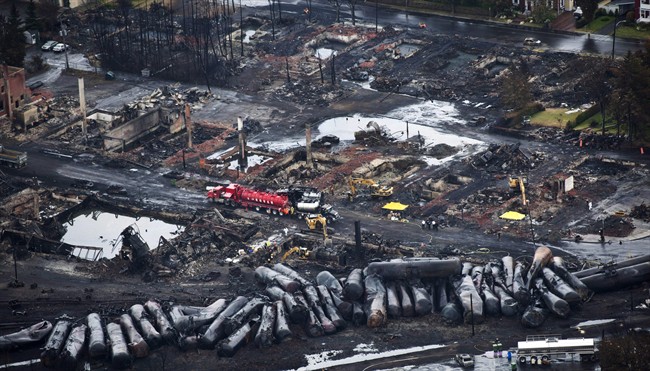MONTREAL – Quebec police investigating the Lac-Megantic train disaster say they’ve visited the United States four times to seize documents and to interview witnesses – and they expect to go back.

A provincial police spokesman said Friday that investigators still have evidence to gather in the U.S. for analysis in Quebec.
“We still have some work to do,” Lt. Michel Brunet said about the cross-border investigation, which was conducted in co-operation with Interpol.
“After analyzing (evidence), sometimes we need to go back just to clarify different things. That’s what we’re going to do.”
Brunet said at least part of the police force’s efforts took place in the Chicago area, where the head office for Rail World Inc. is located. Rail World is the parent company of the railway at the centre of the catastrophe: Montreal, Maine and Atlantic.
READ MORE: Lax safety measures, poor training led to fatal Lac-Mégantic rail disaster
He said Quebec police interviewed many American witnesses and highly placed people in the company, including Rail World president Ed Burkhardt.
But later Friday, a Rail World official said Quebec police had never visited Burkhardt’s Illinois office or ever questioned Burkhardt in the U.S.
Cathy Aldana said police had only ever met with Burkhardt, who was chairman of MMA at the time of the crash, when he visited Lac-Megantic a few days after the July 2013 disaster. She spoke on behalf of Burkhardt, who declined to directly comment on the matter Friday.
“Ed said that the Surete du Quebec (provincial police) interviewed him in Lac-Megantic, but he’s not sure where they’ve been in the U.S.,” said Aldana, who noted that police seized material from MMA’s office last year in Farnham, Que.
Brunet, however, maintained Friday that investigators said they questioned Burkhardt more than once.
WATCH: Audio recordings of conversations between the train engineer and rail traffic control offer new insight into the Lac-Megantic disaster. Mike Armstrong reports.
Police launched the investigation last summer after a runaway MMA train carrying volatile crude oil derailed in Lac-Megantic, set off huge fireballs and wiped out much of the town core. The crash killed 47 people.
News of the police’s evidence-gathering surfaced just as dramatic audio recordings emerged of conversations between Tom Harding, the engineer of the train, and dispatchers at MMA offices on the night of the tragedy.
In one conversation that took place about 30 minutes after the derailment, Harding can be heard telling a dispatcher that Lac-Megantic is on fire and that he can see flames shooting 60 metres into the air.
“It’s incredible, you can’t believe it here,” Harding says.
About two hours later, he gets the news that his train has been involved.
The following is the exchange between the two men:
Dispatch: “OK, but it’s worse than that, my friend.”
- Posters promoting ‘Steal From Loblaws Day’ are circulating. How did we get here?
- Canadian food banks are on the brink: ‘This is not a sustainable situation’
- Video shows Ontario police sharing Trudeau’s location with protester, investigation launched
- Solar eclipse eye damage: More than 160 cases reported in Ontario, Quebec
Harding: “Why?”
Dispatch: “It’s your train that rolled down.”
Harding: “No!”
Dispatch: “Yes, sir.
Harding: “No, RJ.”
Dispatch: “Yes, sir.”
Harding: “Holy f—. F—.
The audio recordings were supplied to The Canadian Press by Harding’s lawyer, Tom Walsh.
Earlier this week, Canada’s Transportation Safety Board released its final report into the derailment, a document that criticized MMA for its role in the disaster and for its “weak safety culture.”
The report, which Brunet said Quebec police are analyzing, also singled out Transport Canada for its poor oversight of the rail industry, particularly at a time when oil-by-rail traffic is soaring in North America.
READ MORE: Will Lac Megantic findings lead to increased rail safety in Alberta?
Montreal, Maine and Atlantic Canada, a subsidiary of the now-bankrupt MMA, and three of its employees have each been charged with 47 counts of criminal negligence causing death – one for each victim of the July 2013 accident.
The accused are Harding, railway traffic controller Richard Labrie and Jean Demaitre, the manager of train operations. Their charges have the potential for serious consequences: a conviction carries a maximum life sentence.
Since it is a company, MMA Canada could only face fines, if convicted.
Some locals who watched the accused enter the Lac-Megantic courthouse for their May arraignment said they hoped authorities would file charges against railway and government officials.
Brunet indicated Friday that the police investigation remains active, but that it’s up to prosecutors to decide whether to make more arrests.
“There’s always a possibility that more charges could be laid,” he said, adding that Quebec police have interviewed 230 witnesses on both sides of the border and collected more than 1,000 pieces of evidence, including “tons and tons” of metal objects.
Police are keeping items like rails, train parts and the locomotives’ black boxes because the criminal investigation remains active, he said.

Comments